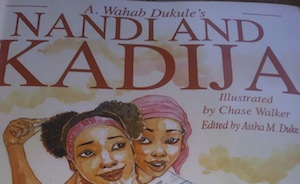The Story of Nandi and Kadija
By Dr. A Wahab Dukule
Published by Outskirt Press
43 pp.
Reviewed by Nvasekie N. Konneh
Growing up as a young boy in Liberia, storytelling or listening to others telling stories was my favorite pastime. I looked forward to it under the moonlight or around the bright kerosene lamp in open space. One story that has stuck in my memory from those days is about two orphan sisters, one of whom got married and as she departed with her new husband, her little sister sang a of lamentation about how her sister was abandoning her for a man.
Ngolo Mama, Ngolo Mama, now you are leaving me
Yes, I am leaving.
The day our mother died, she left me in your care
Yes, I am leaving
The day our father died, he left me in your care
Yes, I am leaving
Though this is an English translation, I have always sung that song in Mandingo, my native language which is spoken widely with various accents in West Africa. I sing this song whenever I feel nostalgic about my childhood. The song always brings me a sense of longing for the past that is gone forever; but one that I can remember fondly.
Reading “Nandi and Kadija: The Tale of Two Sisters from Kiban,” a children’s book written by an erudite scholar and wordsmith, Dr. Abdoulaye Dukule, takes me back to that story from my childhood. Reading this book feels like I am reliving those moments.
Nandi is the little sister and Kadija is the older one. Kadija is the most beautiful girl in town but it’s the little sister who has the magical power to do things ordinary people are unable to do. She inherited that power which has been transferred from one generation to another over the years in her family.
The news of Kadija’s beauty spread far and near Kiban. She was the woman every man desired for himself. So suitors came from everywhere to present themselves. However, for Kadija, her only condition was that she didn’t want any man with a scar on any part of his body. Among the countless men that came was a man named Jina. He was a handsome fellow who came with an entourage of musicians, dancers, storytellers, and with gold loaded on horses and camels. He was examined and found to have no scar and Kadija said that was the man she would marry. Her little sister Nandi suspected that though he didn’t have any scar, he was not a human being. She said this to her sister but she did not want to hear any of it. She felt that her little sister was jealous of her and said she didn’t want to listen to her to say anything bad about her man. After a very beautiful wedding ceremony befitting the daughter of a king, Kadija and her husband left with their companions.
But no sooner had they left town than Jina transformed himself to his non-human form. He was a grotesque monster. Having been betrayed, Kadija regretted marrying the creature. She started thinking of her escape strategies. How could she rescue herself from the danger she found herself in? Why didn’t she listen to her little sister? These and many questions were going through her mind when her little sister Nandi, with the magical powers, came to her rescue. Against the advice of her sister, Nandi had transformed herself into a fly and followed Kadija and she’d been suspicious of her brother in law. Through Nandi’s powers, the two sisters were able to flee from the land of Jina and into the safety of their own home of Kiban.
Reading this story in book form also reminds me of the Anansi tales, which are very popular African stories that survived the violent kidnap and transportation of Africans to the Americas and are still told today. While the Anansi stories, told in various forms, is rooted in the Akan culture of West Africa, this story of Nandi and Kadija is rooted in the Mandingo culture. I might have grown up hearing one version in Liberia or Guinea; this book offers another version. While the Anansi story emphasizes the cleverness of the spider, this one speaks more of the spiritual connection between the seen and unseen in the Mandingo culture.
The setting of the story, Kiban, is way there in the heartland of the Mandingo culture which is found in present day Mali. In this story, Kiban is located on the “Southern edge of the Sahara, tilling towards the vast savanna where elephants and crocodiles roam.” This was before Ghana became Mali and long before the modern nations of Ghana and Mali took on the names of two important West African ancient empires.
What are also interesting about the story are the names of the characters. Names such as Musokro, Balla Koumatigui, or Fama Doukoure can easily be interpreted by any Mandingo speaker of the different variations of that language. Musokro, though the name of a character, as a word means an “elderly lady” who warns and inspires the younger ones as they grow up to take their rightful place in society. Just as her name means, she is playing that elderly role in the story.
Dr. Abdoulaye Dukule is educated and sophisticated in global affairs. Many of his readers are familiar with his commentaries on Liberia in particular and West Africa in general. He has not forgotten his roots. He too might have heard the story around the bright lamp or under the moonlight. I have always thought of how those oral stories of my childhood could be conveyed into books. Dr. Abdoulaye Dukule, who is fluent in both English and French, has set the stage.
As a journalist and writer, Dr. Dukule has maintained a front row seat in the contemporary Liberian history. He was a close confidant of Dr. Amos Sawyer who was Liberia’s interim presidency and under President Ellen Johnson Sirleaf he represented Liberia at the United Nations High-Level Panel of Eminent Persons on the Post-2015 UN Development Agenda. While he is well known for his political commentaries in various publications, this is his first book. It is certainly a delight to every reader and it’s highly recommended for our children who are hungry for knowledge of our past.
So if you are a parent and want your children to read and understand our culture and tradition, this book is recommended for you. The book is available on Amazon.
About the Author: Nvasekie Konneh is a practicing Muslim and a veteran of the US Navy. He’s a poet and writer who has written extensively on Liberia. He’s the author of three books which includes Going to War for America, The Land of My Father’s Birth, memoir of the Liberan civil war and The Love of Liberty Brought Us Together. He can be reached at [email protected]








